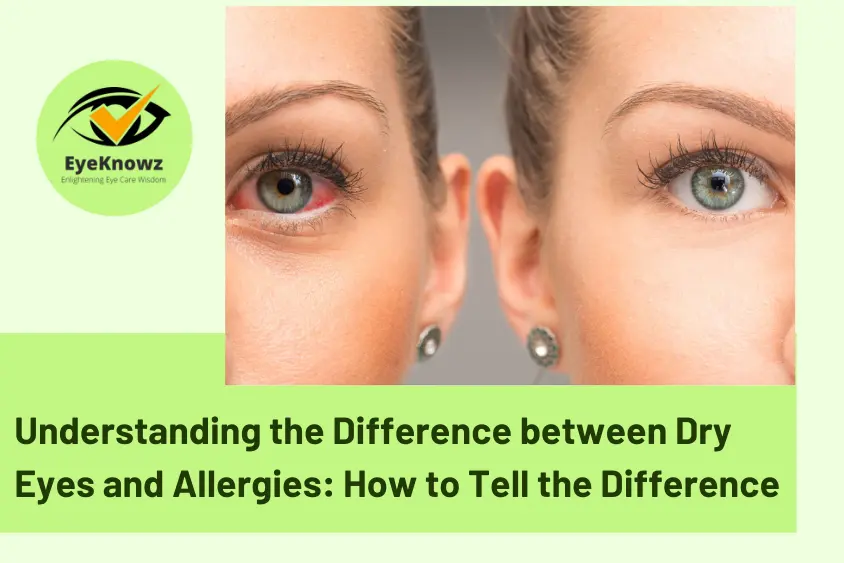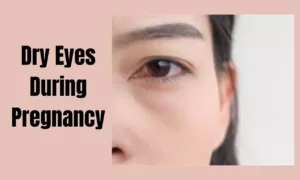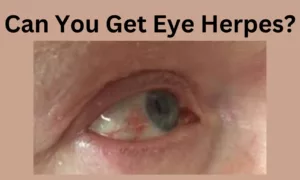Uncover the symptoms and key differences between dry eyes and allergies: Learn how to tell the difference and find relief.
Dry eye and Allergies:
It is likely that you have allergies or dry eye syndrome if you are experiencing eye discomfort without discharge. The symptoms of these two conditions may appear similar, but eye allergies have a different underlying cause than dry eye. There is also a possibility that eye allergies may lead to dry eye syndrome.
Dry eye disease is characterized by red, itchy, and watery eyes, which are also indicators of eye allergies. Symptoms can be diagnosed by a comprehensive eye exam. In addition, dry eyes and allergies can occur simultaneously – and if you wear contact lenses, these two eye conditions can make them more difficult to wear. Find out how dry eye differs from eye allergies by reading on.
Dry Eye:
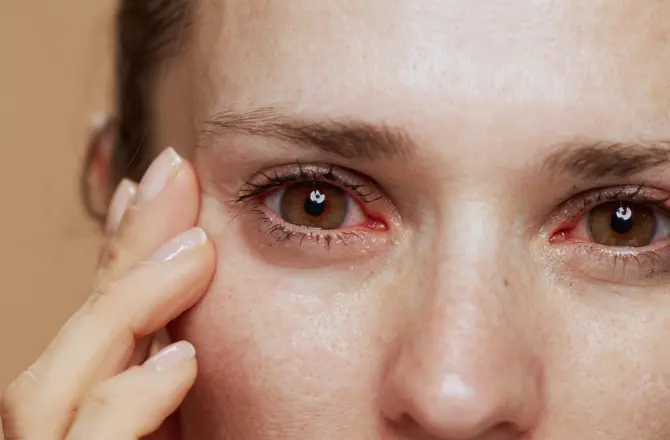
It is a condition that causes your eye’s surface to become dry due to a lack of moisture and lubrication. When your eye glands do not produce enough tears or if the tears are imbalanced, you may experience this condition. Tears keep your eyes clean by moistening them and keeping them free of debris each time you blink.
Tear production and drainage need to be balanced in order to prevent complications. Additionally, tears contain natural cleansers that keep the eyes free of bacteria that might cause diseases. When your tears are unable to lubricate your eyes properly, it is known as dry eye. Insufficient tear production decreased tear composition, or rapid tear evaporation could cause this problem.
Symptoms of Dry Eye:
Dry eyes are characterized by similar symptoms regardless of the cause. It is common for dry eye symptoms to vary, and some may appear to be relatively normal. Symptoms of dry eyes may include:
- The stinging sensation in the eyes
- Sensitivity to light
- Itchy and red eyes
- Experiencing eye fatigue
- Watery eyes
- A feeling of something in your eyes
- Difficulty wearing contact lenses
- Blurry vision
Causes:
It’s common to mistake dry eye syndrome for an eye allergy, especially when diagnosing yourself at home. There are several factors that can lead to dry eye, including:
- Smoking
- Dehydration
- An inadequate tear quality
- Low Moisture
- Lack of tear production
- The fluctuation of hormones during menopause or when taking oral contraceptives
- A person who has Sjogren’s syndrome, rheumatoid arthritis, or thyroid disease.
Allergies:
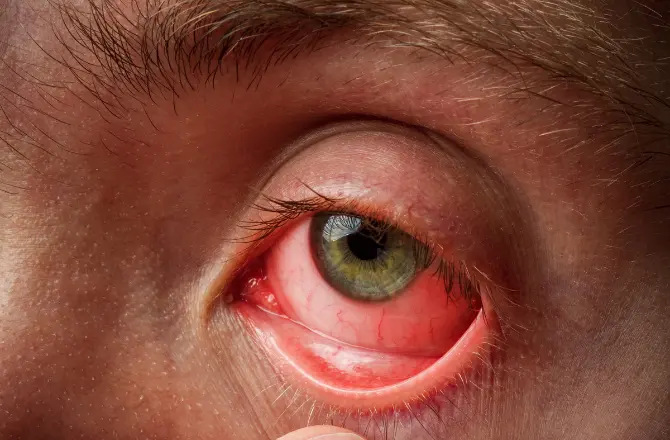
Eye allergies, on the other hand, are caused by irritation of the eyes as a result of an allergen. An allergic reaction to your eyes, often referred to as allergic conjunctivitis, occurs when you are exposed to something you are allergic to. There are many allergens, such as pollen, which can cause allergic reactions, for example. Consequently, the eyes water in order to combat the allergen. It is also referred to as allergic conjunctivitis. It isn’t contagious like bacterial or viral conjunctivitis. Itchy eyes set eye allergies apart from other issues with the eyes.
Allergy Symptoms:
You may experience irritated, red, or painful eyes after being exposed to a trigger. The following are some common symptoms:
- Having itchy eyes
- Red eyes
- Watery eyes
- swelling of the eyelids
- A burning sensation in the eyes
- Light sensitivity
- An under-eye circles
Causes:
Whenever you are exposed to a trigger of some sort, your allergy symptoms become worse. Your symptoms may occur all year or only during certain seasons, depending on your allergy. Eye allergies can be caused by:
- Pollen: It may be ragweed pollen or tree pollen.
- Dust mites.
- Pet dander.
- There is smoke.
- Mold.
- Fragrances and perfumes.
Difference between dry eye and allergies: How to tell the difference:
People often confuse dry eye with eye allergies because both conditions share some common symptoms, including itchiness, soreness, and burning. There are some similar symptoms between dry eye and allergies, such as:
- Redness
- An itchy feeling
- Having scratchy eyes
- Insensitivity to light
- Watery eyes
Obvious differences:
Tear Production:
Tearing can also help you distinguish dry eye from eye allergies. Tears are excessive and constant as a result of allergic reactions. The production of tears is limited when one has dry eye, so excessive tearing does not occur. With dry eye, tears are produced less frequently than when you experience an allergic reaction.
Itchiness:
Eye allergies can be distinguished from dry eye primarily by how many itches they cause. The eyes become itchy and burn when you have eye allergies. They swell, become red, and become watery when rubbed. You may suffer from dry eyes if your eyes are not itchy or the itch is very mild. If you keep rubbing your eyes, you may have an eye allergy. Allergies can also cause itching associated with runny noses and watery eyes.
Inflammation of the eyes:
The swelling of the eye is another defining characteristic of this condition. It is more common for allergies to cause swelling and puffiness than dry eye. Furthermore, you develop dark circles around your eyes, which do not occur with dry eyes.
Treating Dry Eye and Allergies:

Difference between dry eyes and allergies: How to tell the difference? Whenever you experience symptoms of dry eye or allergies, make sure to document what you feel, when they occur, and where you are. This way, your optometrist can determine why you are experiencing symptoms and devise a plan to help alleviate them.
Treatment for Allergies: Prevention of exposure to substances that cause eye allergies is the best way to avoid eye allergies. However, this may not always be possible. Allergens usually subside over time, so avoiding the source of irritation is the best way to prevent irritation.
- An eye allergy treatment typically begins with identifying and avoiding the allergen that causes problems.
- Eye drops containing artificial tears may also help alleviate allergies by removing allergens from your eyes. You may need to use these multiple times a day during allergy season.
- Eye allergies can be prevented by taking oral antihistamines. Consider using eye drops if you need immediate relief. A preservative-free eye drop is the best option for those suffering from allergies.
Treatment for Dry Eye: Do allergies dry out your eyes? It is thought that dry eye disease causes more damage to your eye than eye allergies, though dry eye allergies may cause dry eye disease. Tracking your symptoms will help your doctor make an accurate diagnosis.
- The use of artificial tears usually relieves sore eyes and keeps the eyes moist.
- In order to prevent premature drainage of eye moisture, punctual plugs can be used if necessary.
Conclusion:
In order to find long-term relief from allergies and dry eye disease, the optometrist is the best person to go to. They can advise you on managing dry eyes and avoiding triggers related to allergies. The symptoms of dry eyes and eye allergies can interfere with your daily activities, so seeing a doctor for a diagnosis is essential. Additionally, allergies can lead to dry eye. After several days of treatment, if your eyes have not improved, talk to your doctor. Depending on the assessment, you can choose the most suitable treatment.
Can allergies cause dry eyes?
There is no doubt that allergies can lead to dry eyes. Allergic reactions cause the body to release histamines, which irritate and inflame the eyes. The result is common dry eye symptoms like itching, redness, and discomfort.
What is the difference between dry eyes and allergies?
Dry eyes and allergies are related but distinct conditions. Dry eyes typically result from insufficient tear production or poor tear quality, leading to discomfort and a gritty sensation. On the other hand, allergies involve an immune response to allergens such as pollen, pet dander, and dust mites, which can cause inflammation, itching, and redness in the eyes.
Are dry eyes a sign of allergies?
Yes, dry eyes can be a sign of allergies. Seasonal allergies, in particular, can trigger dry eye symptoms. Allergies may cause dry eyes if you notice irritability, gritty feeling, or irritation during allergy season.

